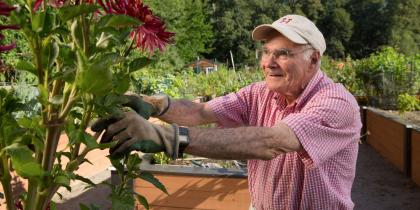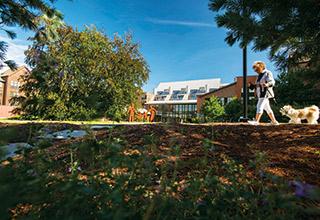Cultivating Wellness: Summer Gardening Tips for Older Adults
Learn how gardening nurtures multiple dimensions of your health and how to create a safe and enjoyable garden space.

Are you looking for a reason to get outside this summer? Consider gardening! Gardening is a hobby you can pick up at any age to cultivate wellness, and a variety of plants thrive in the warmer months.
As an older adult, you may hesitate to try gardening if you have physical limitations or health concerns. But with options such as raised garden beds, ergonomic tools, and indoor gardening, you may not have to miss out on this healthy hobby.
Let’s examine the benefits of gardening and some modifications you can make if you have physical limitations. But first things first — remember to talk to your health care provider before jumping into any new physical activity.
Tips for safe and accessible gardening
Gardening can be physically demanding, especially if you have a chronic health condition that makes it difficult to kneel, bend, grip tools, or perform other tasks. If that’s true for you, think about implementing some of these accessibility hacks to make gardening a more enjoyable and comfortable experience:
Consider raised garden beds
Raised garden beds are what they sound like — garden beds that are raised above the ground. By elevating them, you don’t have to bend over or kneel to enjoy your garden, which reduces the strain on your back and knees. You can also customize raised garden beds, which is a fantastic option if you use a wheelchair or walker and want to make sure your garden is the perfect height for you.
Try kneepads and benches
Even if you don’t want or need a raised garden bed, you can keep your knees safe and prevent discomfort while kneeling. With a kneeling bench or kneepads, you can pad your knees and feel comfortable for longer while tending to your plants.
Try ergonomic garden tools
With ergonomic tools, which are tools designed to decrease the physical impact of gardening on your body, you can get even more done in your garden. Ergonomic gardening tools are often helpful for people with disabilities and can also help prevent injury. Here are some basics to keep in mind when choosing ergonomic tools:
- Not every ergonomic tool will be your perfect fit. If possible, go to a store in person and test out different tools to see what fits most comfortably in your hand.
- Choose ergonomic tools with handles that allow for a two-handed grip. Some of the work you’ll be doing in your garden could require you to use both hands.
- Look for tools with larger grips, which tend to be easier to hold.
- Tools with extra-long handles allow you to avoid bending over, which reduces your risk of back injury.
- Ergonomic gardening gloves support your hands, prevent you from getting hurt, reduce fatigue, and help you grip gardening tools more securely.
- Handheld tools with thumb indicators can keep your hand in a neutral position and reduce pressure on your wrists.
Choose the right plants
Do your research before you choose your plants! If you’re new to gardening, plants that require less work might be the way to go. Remember to check that they’re suited to your climate and in season. Choose plants that are compatible with each other. Growing the right plants next to each other can help both plants thrive, a concept known as companion planting.
Remember sun protection
Stay hydrated and prioritize sun safety tips, such as applying sunscreen and wearing a wide-brimmed hat. Timing matters, too. Think about gardening early in the morning or later in the afternoon rather than when the sun is at its peak.
Indoor gardening
You don’t have to go outside to garden. If you have mobility issues or you simply prefer the indoors, there’s a lot you can do from inside your home. Even if you don’t have any spots with natural sunlight, you can find a way with artificial grow lights. You’ll just have to research what plants are best for indoor conditions.
How gardening can improve your health
Gardening has physical, mental, emotional, and social benefits for older adults. Here’s just a small list of some of the rewards it can offer:
It’s relaxing
Sunshine, exposure to vitamin D, and fresh air are good for you. One study found that gardening can increase relaxation in older adults by lowering blood pressure and improving brainwave activity.
It builds muscle strength
The U.S. Department of Health and Human Services Physical Activity Guidelines list the digging, lifting, and carrying you do while gardening as examples of muscle-strengthening activities for older adults. Gardening is also a multi-component physical activity, which is important to decrease your risk of falls.
It lowers your risk of disease
Are you looking for a way to improve your overall physical health? Gardening can help! Gardening has been linked to better cardiovascular health and a decreased risk of diabetes in older adults. You’re also more likely to eat fruits and vegetables that offer their own health benefits.
It fosters social connection
Loneliness and social isolation are an epidemic in the United States and increase the risk of premature death by 26% and 29%, respectively. Of course, gardening can offer you a blissful sanctuary to enjoy alone time. But if you’d rather garden with family, friends, or as part of a community garden, it can be a great way to connect with others and mitigate harmful loneliness.
Gardening as a spiritual practice
At Hebrew Rehabilitation Center in Boston, life enhancement gardens keep patients engaged and connected. Patients gathered outside for an interfaith prayer program featuring songs and prayers to bless the plants in the gardens on the patio. They enjoyed an afternoon of singing, dancing, and praying together by the garden.
If spirituality matters to you, gardening may benefit your spiritual fulfillment. “Planting, and marking these moments with song and ritual, are so beneficial for the spiritual and emotional health of the older people we care for, providing them with purpose and meaning, connecting them to childhood or lifetime memories of gardening, and celebrating the holy work they have done to help make our world a little more beautiful for all generations,” says Leah Nussbaum, staff chaplain at Hebrew Rehabilitation Center, who co-led the program.
Gardening and nature are important in many faiths. “Planting holds deep spiritual and moral significance in many faith traditions. In the Torah/Bible, the first humans were placed in the Garden of Eden to enjoy and nurture the natural world. It’s wonderful to see seniors enjoying the shade of the trees, the plants, the birdsong, and even spotting the occasional bunny — grounded in tradition and humanity,” explains Leah.
If you’re interested in intentionally incorporating spirituality into your gardening practice, here’s a blessing from the program to help get you started. You can also find blessings online that resonate with you more or better match your spiritual belief system or come up with your own. There are no rules!
“O God, bless this garden with rain and sunshine. Bless the soil and the seeds, the worms, bugs, and snails, the tiny roots and buds just beginning to come to life in the warm dirt. As we dig in the dirt and work in the soil, may it provide an opportunity for us to actively engage in caring for the Earth, connecting with and caring for one another, creating, nurturing, and sustaining sacred community.”
Creating sensory gardens for people with dementia
Gardening can also be valuable to people with dementia. It can offer a sense of connection with nature, people, and the moment. One study found that horticultural therapy — gardening with the help of trained therapists — can improve quality of life, happiness, and immunity for adults with mild Alzheimer’s disease.
One option is to create a sensory garden, which is a garden designed to appeal to your senses. Using the five senses activates the different regions of the brain in people with dementia, which can help them reconnect with distant memories. At Hebrew SeniorLife’s memory care assisted living community, residents can spend their time in a courtyard adorned with beautiful plants and flowers.
In a sensory garden, you may include plants with a strong, pleasant scent, like lavender, basil, rosemary, or honeysuckle, or a unique touch sensation, like plants with a distinct leathery or fluffy texture. Some examples of plants with a particular touch sensation include silky soft lamb’s ears, the leathery southern magnolia, and the spiky sea holly. Bark from trees, smooth rocks, and fruits offer their own textures. Fruits and vegetables are valuable because they tackle another important sense: taste! Colors and artwork are worthy additions as well.
Wind chimes can add an element of sound to your sensory garden. Some plants, such as bamboo, make noise as wind flows through them. A birdbath could add the sound of trickling water to your garden plus draw in chirping birds with unique songs and vibrant colors.
Safety is also essential. Keep pathways accessible and consider any physical limitations that may affect the sensory garden’s usability.
The University of Illinois Urbana-Champaign came up with a guide on how to create a sensory garden that offers other suggestions on adding sight, smell, sound, touch, and taste to your sensory garden.
Put down roots and bloom at Hebrew SeniorLife
Hebrew SeniorLife recognizes the positive impact of time in nature on your well-being. That’s why our continuing care retirement communities NewBridge on the Charles in Dedham, MA, and Orchard Cove in Canton, MA, are engulfed by stunning natural environments. Residents at multiple Hebrew SeniorLife communities, including Orchard Cove, NewBridge on the Charles, Leyland Community in Dorchester, and our patients at Hebrew Rehabilitation Center, have gardening available to help them live their best lives.
Are you interested in learning more about senior living? Connect with us online today.
Blog Topics
Learn More
Luxurious, Intergenerational Living
At NewBridge on the Charles in Dedham, MA, you'll find modern senior living on a 162-acre intergenerational campus. We offer a complete continuum of care to support your best life, as you define it.

Programming for Every Interest
At Orchard Cove in Canton, MA, you can discover your hidden talents. Whether it's art, discussing current events, writing, cooking, kayaking, or gardening, there are many programs to explore.



